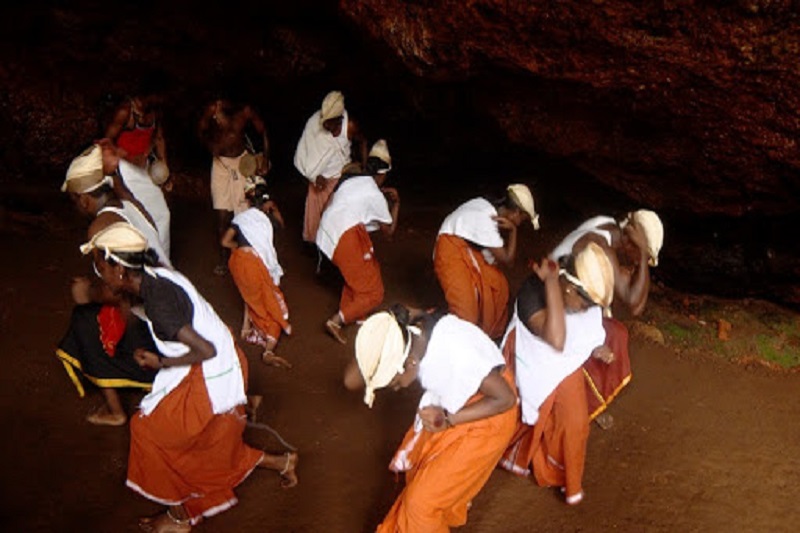Arts Of Malabar
The art forms of Malabar are famous for its enviable cultural symbol. Malabar’s cultural distinct is entirely different from other parts of Kerala. The region, still hold centre stage for old arts, is known for some of the exciting art forms like Theyyam, Kalaripayattu, Muslim art form like Oppana, Kolkali, Duffmuttu and a few folk and tribal arts.
Theyyam
A mesmerising ritual dance, Theyyam is an art form where deities dance for removing the evil from this world. The Malabar area of Kerala has the credit of giving birth to and preserving this unique artistic tradition. Theyyam is, apart from being an art form, a mode of worship as well. It is believed that by performing Theyyam, the performer derives the identity of God and is able to cure ailments and bring prosperity to the land. Derived from the word Daivam, meaning God, Theyyam or Theyyattam is most commonly found in the traditional Kolathunadu of the present Kannur and Kasaragod District. Representation of a divine or heroic character from mythology, Theyyam is normally performed in houses, tharavads and shrines. The songs of Theyyam are known as Thottam Paattu (paattu- song). The costume and the elaborate headgear made with natural sources like leaves, flowers and natural powders are colourful and intricate. The movements and tempo have essentially a tribal nature.
One of the most dazzling and visually appealing art forms of Kerala, Theyyam has won international reputation for its unique artistic as well as cultural aspects. Dates back to some 1500 years old, Theyyam remains the most untainted art form that has managed to survive the test of time and technology.
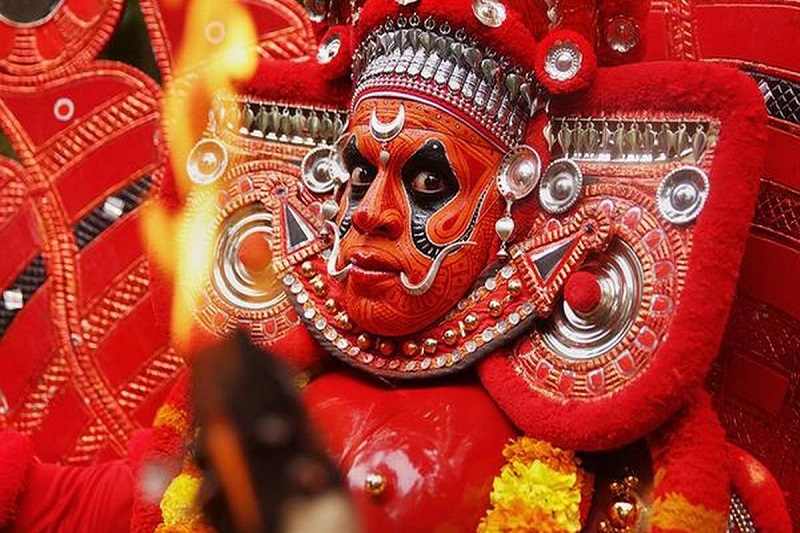
Alamikkali
An artform said to be on the brink of total extinction, Alamikkali, is practised in Mangalore and a few towns in Kasaragod where the Muslim community is predominant. Alamis were considered the soldiers of Mysore king Tipu Sultan. Alamikkali was celebrated to commemorate the Karbala war, an important chapter in Muslim history, in connection with the celebration of Muharram. This dying art form originated in the Alamipalli in Kasaragod. Today, it is also performed at cultural events in a bid to restore this lost tradition.
With charcoal powder and white spots applied all over the body, the Alamis or performers, usually five or six in number, move in groups. As wanderers, they go to various houses and dance to the tunes of a particular rhythm.
Alamikkali is considered special, with Hindu performers taking part in the dance and the Muslim community performing the customary rituals. This confluence of religions stands as an eloquent testimony to the communal harmony prevalent in the region.
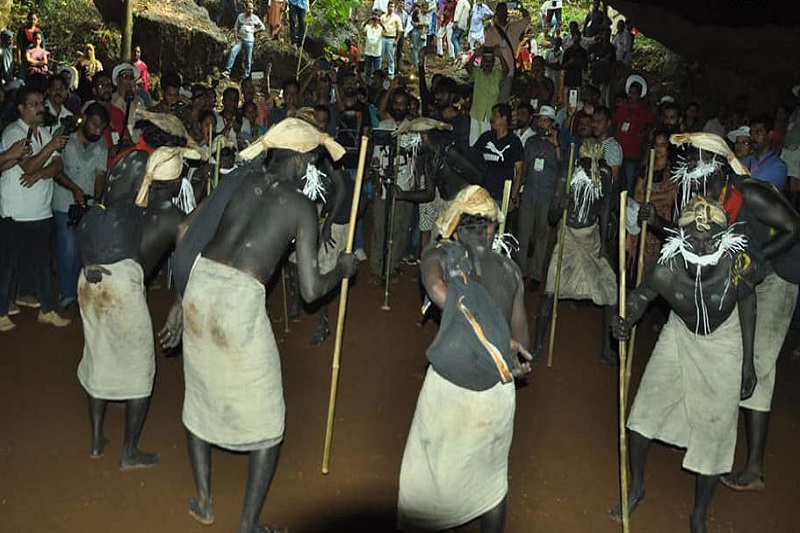
Kalaripayattu
Kalaripayattu is the martial art form of Kerala which is regarded as the oldest and most scientific of its kind in existence. This martial art is known for its graceful and flexible body movements and the remarkable speed with which it is performed. Training in combat is given at Kalari (training schools). According to Kalari principles, the education of this art form begins with an oil massage of the body. The training of Kalari includes rigid rules for self discipline and physical fitness. Feats like chattom (jumping), ottam (running), marichil (somersault) etc are taught and is followed by lesson in the use of weapons such as daggers, swords, spears, maces, bows and arrow. There are four divisions in the training of combat – Maithozhil (postures, steps and airborne exercise), Kolthari (use of sticks of different sizes and shapes), Valthari (use of swords, daggers and long blades) and Verumkai (free hand).
The Kalaripayattu training aims at the ultimate co-ordination of mind and body. Once the training is complete, a person should undergo regular oil massage and to be engaged in the practice of the feats at least once a year to help him to keep in shape.
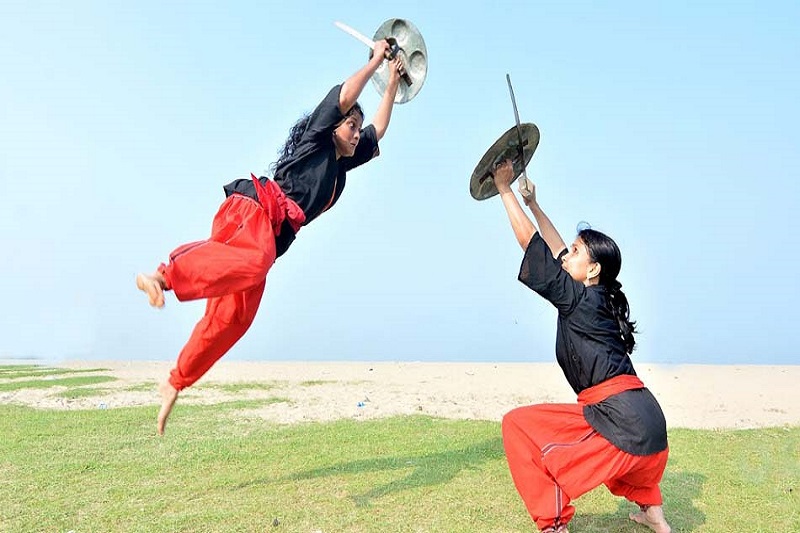
Poorakkali
Poorakkali is a ritual dance performed by men during the nine day Pooram festival in Bhagavathy temples across the erstwhile state of Kolathunadu (northern Kerala). The festival, to propitiate Kamadeva (the god of love), begins with the Karthika asterism and concludes on the Pooram asterism of the Malayalam month of Meenam (Pisces).
Performed by a group of young men in loin clothes, this circular dance around a huge multi-decked wick lamp or nilavilakku involves a lot of martial skills and masculine movements. This art form has no singers or orchestra accompanying the performance. The dancers themselves sing and keep rhythm by movements of the foot and clapping of hands. Songs based on mythology, in praise of Goddess Saraswathy (goddess of learning and art) and Lord Ganapathy (the elephant headed god) is sung. The dance begins with systematic rituals after an invocation. Usually the dancers observe a month of abstinence and strenuous practice before the performance. A dance form on the verge of extinction, efforts are on by the government to keep Poorakkali alive.
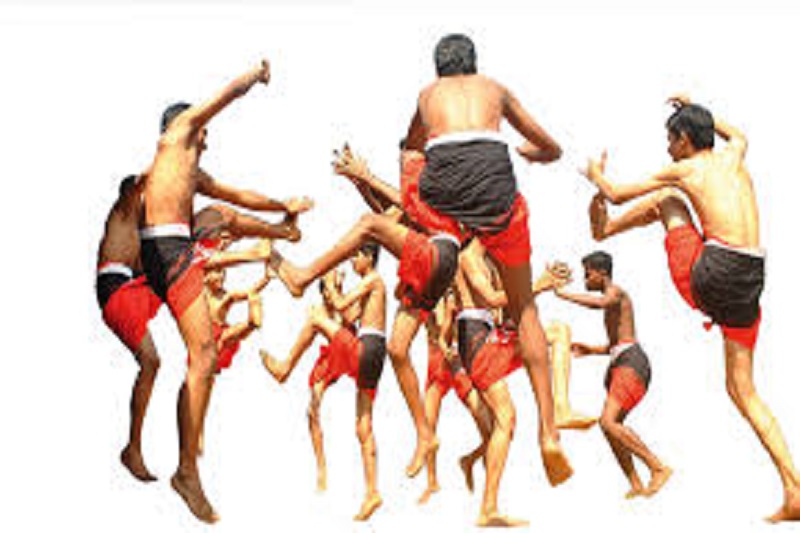
Oppana
Oppana, the traditional and social entertainment dance, is part of the wedding celebrations of the Mappila (Muslim) community in the Malabar region. Colourful costumes and rhythmic steps are the features of this dance, mostly performed by women on the day before wedding. The bride will be dressed in the traditional attire with golden brocade and is seated in the middle of the dancers. The dancers are maidens and young female relatives of the bride. They sing and dance around the bride, clapping their hands and teasing her about the nuptial bliss.
The songs are taken from Mappilappattu, a genre of songs based on Muslim folklore. The songs are first sung by the leader and are repeated by the chorus. The musical instruments used in Oppana performance are Harmonium, Tambourine, Ilathalam (cymbals) and Tabla. Oppana is often presented as a stage item today.

Mappilappattu
Mappilappattu or Mappila songs are the traditional folk songs sung by the Muslim community of Malabar. Depiction of Muslim culture is best done with this art form. Basically sung in an Arabic-Malayalam mixture, the songs use words and phrases borrowed from other languages like Arabic, Urdu, Persian, Hindi, Tamil, Sanskrit and Kannada. Mappilappattu forms the integral part of the rich musical heritage of Malayalam. The rhythm of these songs is a perfect blend of Arabic and Malayalam folk tunes. The metre of Mappila songs are denoted by the term Isal. Diverse- devotion, romance, satire, heroism etc. are some of the popular themes of these lively songs.
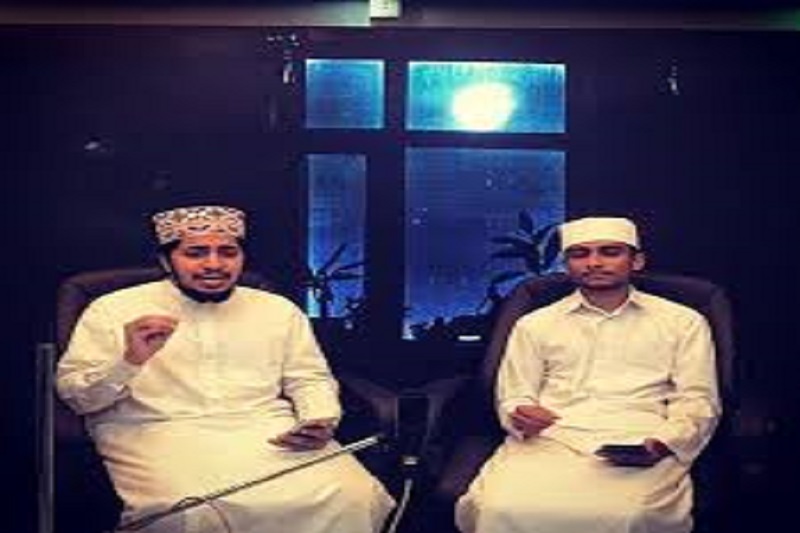
Kolkali
An interesting folk dance from Malabar region of Kerala, Kolkali is an art form in which the performers move in a circle. A combination of two words, kol meaning the stick and kali meaning the dance, Kolkali creates mesmerizing rhythmic effects. During Kolkali the dancers, all males, dance to the rhythmic beating of the sticks. Folk songs and musical instruments like Chenda, Ilathalam, Maddalam and Chengila add zest to the performance.

Duffmuttu
Duffmuttu is a group performance popular among the Muslims of Malabar. Duffmuttu is staged as a social event during festivals, weddings and uroos - annual festival conducted in mosques. The performers beat on a shallow round percussion instrument called the Duffu. The leader of the group sings the lead, while the others form the chorus and move in circles. The songs of Duffmuttu are often tributes to martyrs, heroes and saints. Duffmuttu can be performed at any time of the day and has no fixed time limit. A variant of this art form is the Arabanamuttu, which is also called Aravanamuttu. Here it uses the instrument ‘arabana’ instead of duff.
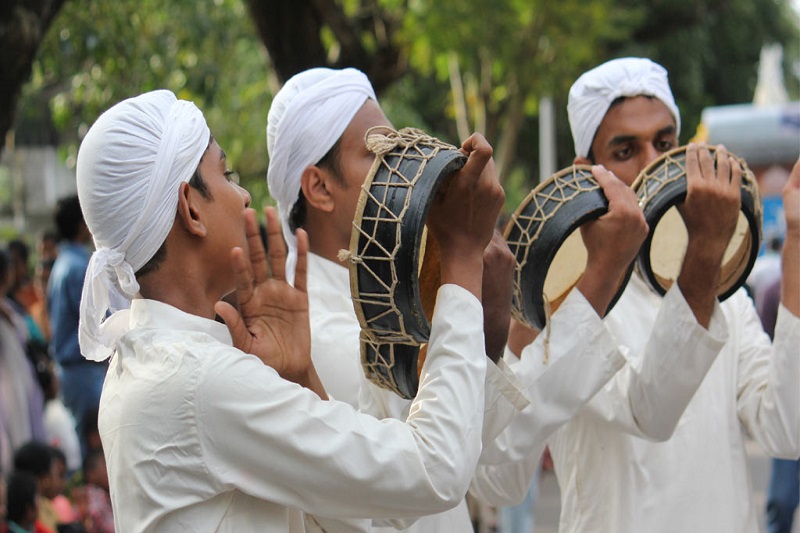
Yakshagana
Yakshagana or the music of the celestial beings is considered to be a 400-year-old dance opera. Yakshagana is a popular theater dance-drama that combines dance, music, dialogue, costume, elaborate make-up and stage techniques in a unique style and form. Originated in the state of Karnataka, this classical dance-drama is also prevalent in the Kasaragod district of Kerala.
The themes of the plays are taken from the epics, Ramayana and Mahabharatha. The story is narrated through systematic singing in chorus, accompanied by percussion instruments. The accompanying orchestra includes percussion instruments like chenda, maddalam, jagatta or chengila (cymbals) and chakratala or elathalam (small cymbals). Generally the art form is presented in Kannada, though it is also performed in Malayalam as well as Tulu.
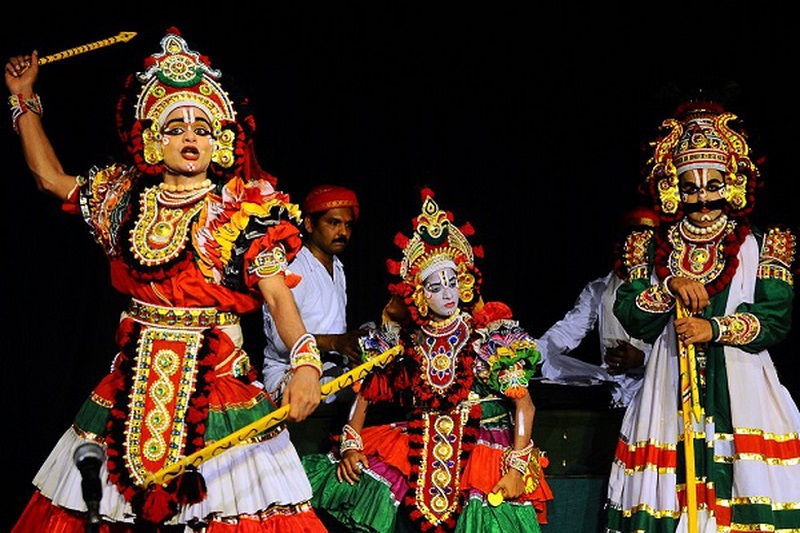
Mangalamkali
Mangalamkali, performed as an entertainment, is a ritual dance related to marriage functions in the erstwhile state of Kolathunadu (northern Kerala). It is also considered to be a tribal dance as it is performed by Pulayas(a tribe in popular in Kerala). Noted for the fast steps, the musical accompaniments of Mangalamkali are Para and Kannupara (a kind of drum), two folklore instruments.
Usually performed before the senior members of the community, the theme of the song is not directly related to marriage. Performed mostly at night the Mangalamkali goes on till the wee hours of the morning.
